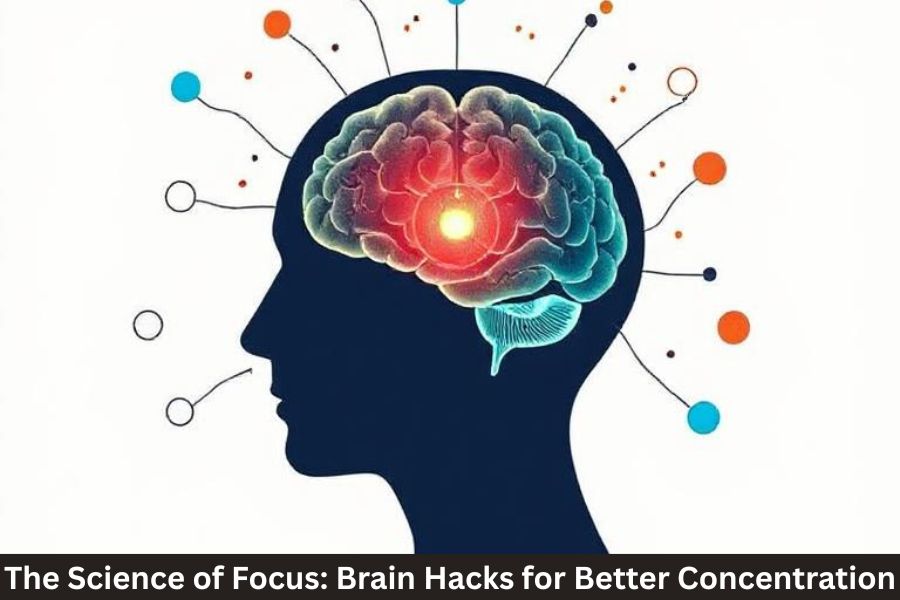In an age of constant notifications, multitasking, and digital distractions, staying focused has become a superpower. Whether you’re studying, working, or pursuing personal goals, your ability to concentrate deeply determines how much you accomplish and how well you do it.
The good news? Focus isn’t just a personality trait—it’s a skill you can train. Backed by neuroscience, these brain-based hacks will help you sharpen your concentration and perform at your peak.
Why Focus Matters More Than Ever
- Improves memory and learning
- Boosts productivity and creativity
- Reduces time wasted on distractions
- Lowers stress and mental fatigue
- Increases success in both work and life
Focus is what allows you to move from “busy” to truly effective.
The Brain Science Behind Focus
Your brain has two major attention systems:
- Top-Down (Voluntary Attention): The intentional focus you use to read, study, or work. Controlled by your prefrontal cortex.
- Bottom-Up (Reactive Attention): Triggered by sudden sounds or visual changes—like notifications or a buzzing phone.
Modern life constantly hijacks your bottom-up system, making it harder to access deep focus states. That’s why training your brain to sustain top-down attention is critical.
Top Brain Hacks for Better Concentration
1. Use the Pomodoro Technique
Work for 25 minutes, then take a 5-minute break. After 4 rounds, take a longer 15–30-minute break.
- Reduces mental fatigue
- Encourages consistency
- Works with your brain’s natural rhythm
Why it works: Your brain stays fresh and focused in short, structured bursts.
2. Practice Mindfulness Meditation
Just 5–10 minutes a day of mindfulness improves attention span and reduces mind-wandering.
Try this:
- Sit comfortably
- Focus on your breath
- When your mind drifts, gently return your focus
Why it works: Strengthens the prefrontal cortex and improves your brain’s “attention muscle.”
3. Use Focus-Enhancing Sounds
Try:
- White noise
- Binaural beats
- Instrumental music (Lo-fi, classical, ambient)
Avoid lyrics—they engage language centers and divide your focus.
Why it works: The right sounds block distractions and help trigger flow state.
4. Feed Your Brain Smart Fuel
What you eat affects how you focus. Boost brain power with:
- Omega-3s (nuts, seeds, fatty fish)
- Antioxidants (berries, leafy greens)
- Moderate caffeine (green tea, coffee)
- Hydration (even mild dehydration can impair focus!)
Avoid sugar crashes and ultra-processed foods—they zap your energy and mental clarity.
5. Eliminate Digital Distractions
Turn off notifications or use focus tools like:
- Forest (gamifies phone-free time)
- Freedom (blocks websites/apps)
- Cold Turkey (hardcore focus tool)
Why it works: Your brain loses momentum every time you shift attention. Minimizing interruptions preserves your cognitive momentum.
6. Prioritize Quality Sleep
Sleep consolidates memory, restores mental energy, and sharpens focus.
Tips:
- Aim for 7–9 hours/night
- Keep a regular sleep-wake schedule
- Avoid screens 1 hour before bed
Why it works: Sleep resets your brain’s “attention filter” and improves executive function.
7. Move Your Body Daily
Even 15–30 minutes of physical activity:
- Increases blood flow to the brain
- Boosts mood and motivation
- Enhances cognitive flexibility
Try walking meetings, yoga, or mid-day stretching for a quick focus boost.
8. Set One Goal at a Time
Multitasking is a myth—your brain switches tasks, not performs them simultaneously.
Instead:
- Focus on one task per time block
- Set a clear goal for each session
- Use visual cues (sticky notes, whiteboards) to stay on track
Why it works: Single-tasking increases depth, accuracy, and speed of work.
9. Use Visualization and Mental Rehearsal
Before a focus session:
- Visualize yourself completing the task
- Picture success in detail (feelings, surroundings, outcomes)
Why it works: Trains your brain to expect focus and success, increasing engagement.
10. Declutter Your Space = Declutter Your Mind
Clear your desk, close unnecessary browser tabs, and create a calm workspace.
- Add a plant or natural light
- Remove visual distractions
- Keep only what you need
Why it works: A clean environment reduces cognitive load and supports mental clarity.
FAQs
Q1: How long can the average person focus?
Most people can concentrate deeply for 25–50 minutes before needing a break.
Q2: Can I improve my focus permanently?
Yes. Focus is like a muscle—the more you train it, the stronger it gets.
Q3: What causes brain fog and distraction?
Common culprits: poor sleep, dehydration, stress, poor diet, and too much screen time.
Q4: Are brain supplements worth it?
Some nootropics show promise, but food, sleep, and exercise remain the most effective focus boosters.
Q5: Can music help me concentrate?
Yes—if it’s instrumental and calming. Avoid music with lyrics while doing focus-heavy work.



